A) she will experience a drop in total utility.
B) she is not acting rationally.
C) she will experience an increase in total utility.
D) None of these is true.
F) A) and C)
Correct Answer

verified
Correct Answer
verified
Multiple Choice
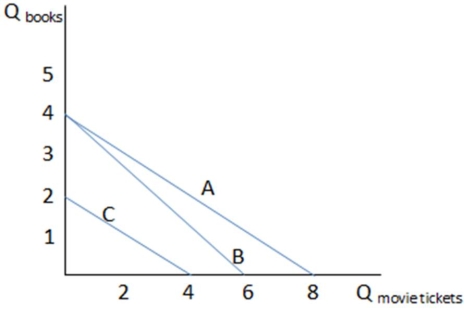 Assume Bryce's budget constraint is represented by line B in the graph shown.Which of the following would cause Bryce's budget constraint to shift to A?
Assume Bryce's budget constraint is represented by line B in the graph shown.Which of the following would cause Bryce's budget constraint to shift to A?
A) The price of books increased.
B) The price of books decreased.
C) The price of movie tickets increased.
D) The price of movie tickets decreased.
F) A) and C)
Correct Answer

verified
Correct Answer
verified
Multiple Choice
Linus has just watched two hours of TV.We can say:
A) his second hour of watching TV likely reduced his total utility.
B) his second hour of watching TV likely added less to his total utility than did the first.
C) if he watches a third hour it will likely decrease his total utility.
D) if he watches a third hour it will likely increase his total utility by at least as much as the second.
F) All of the above
Correct Answer

verified
Correct Answer
verified
Multiple Choice
Courtney goes for an hour bike ride which yields a marginal utility of 8.She stops and gets an ice cream cone,and then rides her bike for another hour.We can say:
A) the utility gained from a second ice cream cone was more than a second hour of bike riding.
B) the utility gained from the ice cream was more than 8.
C) the utility gained from the ice cream was less than the second hour of bike riding.
D) the utility gained from a third hour of biking would be less than the utility gained from the one ice cream.
F) A) and C)
Correct Answer

verified
D
Correct Answer
verified
Multiple Choice
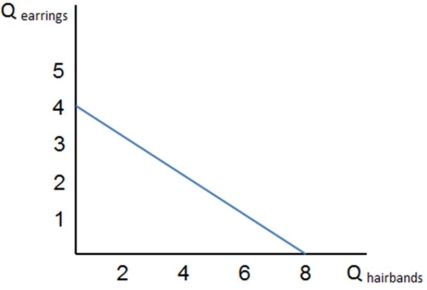 If the graph shown represents Taylor's budget constraint,which of the following consumption bundles could Taylor choose?
If the graph shown represents Taylor's budget constraint,which of the following consumption bundles could Taylor choose?
A) Taylor cannot choose to consume any of these bundles
B) Two pairs of earrings and six hairbands
C) One pair of earrings and six hairbands
D) Four pairs of earrings and eight hairbands
F) C) and D)
Correct Answer

verified
Correct Answer
verified
Multiple Choice
Utility measurements are:
A) a relative ranking of how much different people enjoy a particular good.
B) used to compare one person's preference for a good to another person's preference.
C) a relative ranking of the satisfaction a person gets from alternative combinations of things.
D) None of these is true.
F) A) and C)
Correct Answer

verified
Correct Answer
verified
Multiple Choice
This table shows the different combinations of goods that Jack can consume,given that his income to spend on these two items is $10.  Considering the information in the table shown,Jack's total utility from consuming bundle D would be:
Considering the information in the table shown,Jack's total utility from consuming bundle D would be:
A) 1,160.
B) 1,300.
C) 950.
D) 2,220.
F) None of the above
Correct Answer

verified
Correct Answer
verified
Multiple Choice
According to revealed preference a consumer that chooses to smoke cigarettes:
A) derives more utility from smoking than the goods they could have purchased with that same money.
B) derives more happiness from smoking than the goods they could have purchased with that same money.
C) is minimizing their utility given the options available to them.
D) is behaving irrationally.
F) B) and C)
Correct Answer

verified
Correct Answer
verified
Multiple Choice
The concept of marginal utility:
A) explains why individuals find it difficult to maximize their total utility.
B) is the change in total utility that comes from consuming one additional unit of a good or service.
C) can only be applied to situations in which individuals can choose among several goods or services.
D) is the loss in utility from making a bad decision.
F) B) and D)
Correct Answer

verified
Correct Answer
verified
Multiple Choice
This graph shows three different budget constraints: A,B,and C. 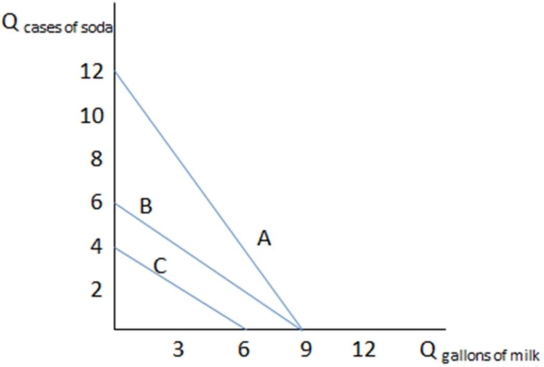 If Larry has budget constraint B in the graph shown,what is his opportunity cost of one gallon of milk?
If Larry has budget constraint B in the graph shown,what is his opportunity cost of one gallon of milk?
A) It is 6 cases of soda.
B) It is exactly one case of soda.
C) It is less than one case of soda.
D) It is more than one case of soda.
F) A) and B)
Correct Answer

verified
Correct Answer
verified
Multiple Choice
You decide to buy your friend lunch after she helped you study for your exam.This is an example of the economic concept of:
A) marginal utility.
B) altruism.
C) reciprocity.
D) a Veblen good.
F) All of the above
Correct Answer

verified
Correct Answer
verified
Multiple Choice
Bobby makes a New Year's resolution to lose weight.On January 3rd,he decides to go to Ben amp; Jerry's for ice cream instead of going to the gym.Using the concept of revealed preference,economists would most likely conclude that Bobby:
A) is not a rational individual.
B) actually gains more utility from ice cream than working out.
C) has changed his preferences.
D) has no choice over the actions he takes.
F) A) and B)
Correct Answer

verified
Correct Answer
verified
Multiple Choice
This graph shows three different budget constraints: A,B,and C. 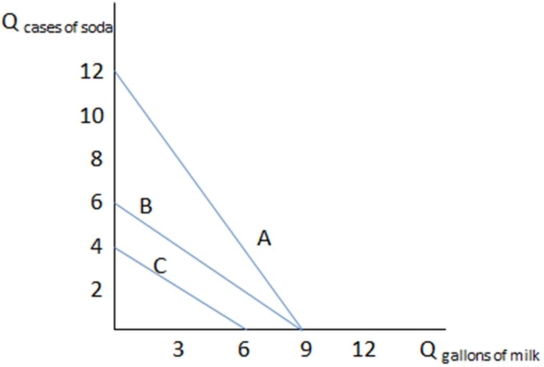 If Bart has budget constraint A in the graph shown,what would cause his budget constraint to shift to B?
If Bart has budget constraint A in the graph shown,what would cause his budget constraint to shift to B?
A) Bart's income has decreased.
B) The price of soda has increased.
C) The price of soda has decreased.
D) The price of milk has increased.
F) None of the above
Correct Answer

verified
Correct Answer
verified
Multiple Choice
Quinn's income to spend each month on two normal goods,bowling or eating out,is $100.It costs $10 to bowl for the night,and it costs $20 for Quinn to eat at a restaurant.Quinn currently consumes four nights of bowling and three meals at a restaurant.If the price of bowling increased to $15,the income effect would predict:
A) Quinn would consume more of each good.
B) Quinn would consume less of each good.
C) Quinn would consume more bowling and less meals out.
D) Quinn would consume less bowling and more meals out.
F) B) and D)
Correct Answer

verified
B
Correct Answer
verified
Multiple Choice
Betty is out on a first date with Barney.She decides to order the garden salad with dressing on the side in an effort to make a good first impression,even though she prefers leg of lamb.Economic theory:
A) cannot explain why someone would choose a meal that brings her less utility than another.
B) would suggest that making a good impression with her choice will bring her more utility than ordering lamb and making a bad impression.
C) would suggest that she values what Barney thinks of her and will derive negative utility if she does not impress him.
D) cannot be used to explain matters of the heart.
F) None of the above
Correct Answer

verified
Correct Answer
verified
Multiple Choice
Utility is:
A) useful in comparing the relative satisfaction different consumers get from a particular good.
B) useful in predicting when to put an item on sale.
C) useful in quantitatively describing a person's preferences for one good over another.
D) an interesting concept, but not really useful for anything.
F) None of the above
Correct Answer

verified
Correct Answer
verified
Multiple Choice
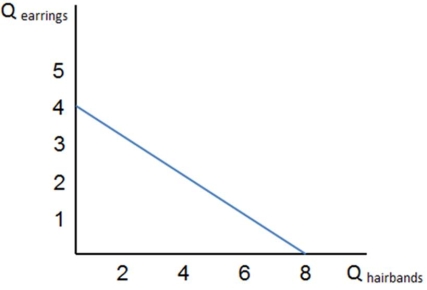 Assume Willow's income to spend on either earrings or hairbands is $24.If her budget constraint is pictured in the graph shown,which of the following must be true?
Assume Willow's income to spend on either earrings or hairbands is $24.If her budget constraint is pictured in the graph shown,which of the following must be true?
A) Willow will buy more hairbands than earrings because they are less expensive.
B) Willow will buy more earrings than hairbands because they are less expensive.
C) Hairbands must cost $3, and earrings must cost $6.
D) Hairbands must cost $8, and earrings must cost $4.
F) None of the above
Correct Answer

verified
Correct Answer
verified
Multiple Choice
Nick has $300 a month to spend on detailing his sports car or buying bottles of good wine.It costs $100 to have his car detailed and $50 for a bottle of wine.He currently buys four bottles of wine and has his car detailed once a month.If the price of detailing his car decreased to $75,Nick's budget constraint:
A) would shift straight outward, because he is relatively wealthier.
B) would rotate and change slope because relative prices have changed.
C) would shift straight inward because he is relatively wealthier.
D) One cannot determine what would happen without knowing Nick's marginal utility of each good.
F) A) and D)
Correct Answer

verified
Correct Answer
verified
Multiple Choice
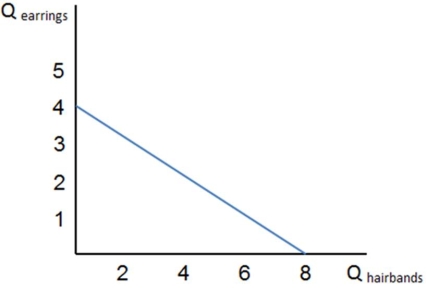 Assume the graph shown represents Dana's budget constraint.If Dana's income to spend on these two items decreased,which of the following could be said?
Assume the graph shown represents Dana's budget constraint.If Dana's income to spend on these two items decreased,which of the following could be said?
A) Dana will buy more hairbands now because they are relatively less expensive.
B) Dana will be able to buy less of both goods.
C) Dana will derive more utility from each item, because she values each one more now that she's poorer.
D) All of these are true.
F) A) and C)
Correct Answer

verified
B
Correct Answer
verified
Multiple Choice
Individuals will make choices to maximize their:
A) constraints.
B) utility.
C) income.
D) values.
F) B) and C)
Correct Answer

verified
Correct Answer
verified
Showing 1 - 20 of 130
Related Exams